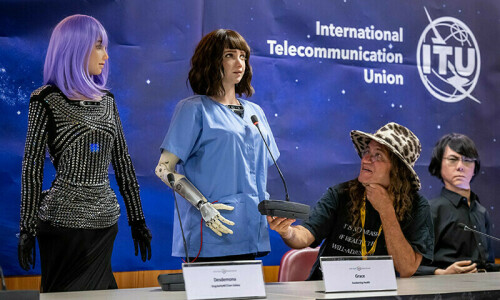
LAST December, I observed a child watching a fire made by watchmen in our street to keep warm. The dance of the flames fascinated her but the heat she felt stopped her from going too close, which was a safe response.
Mysterium tremendum et fascinans (mysteries that we simultaneously admire and fear); theologian-philosopher Rudolf Otto coined this phrase to describe the human response to the incomprehensibility of extraordinary phenomena that people encounter. This triggered the thought of artificial intelligence, an invention unlike anything humans have created. From carrying out complex medical diagnoses to engaging in poetic conversations, AI is fascinating. But there is another side to it as well, a power that can have hugely undesirable consequences for people and the environment.
Technologies require negotiation. A well-negotiated car — serviced and well-driven — serves superbly for years. Mishandled, it gives trouble and becomes a burden. When technologies have a collective social use and impact, this negotiation involves wider material, legal and social factors for the realisation of its full potential. Continuing with the example of the car, these broader factors include, among other things, suitable roads, traffic regulations, an effective licensing system and considerate behaviour by drivers. In short, a technology’s potential — will it serve the few or the majority? — is fated in an ecosystem.
As it happens, the world today, the ecosystem in which AI is born, is not enviable. It is rather hugely worrisome: a closely interconnected world yet one where many people display a propensity to hate those defined as the ‘other’ through polarising ideologies; an unprecedented scientific knowledge of the physical world, yet a fragile relationship with nature; and, an unparalleled technological promise with serious threat to freedom and privacy. Hope and despair, like shadow and sunshine, are interlocked by these paradoxes.
At the heart of these conditions is the escalating concentration of wealth in fewer and fewer hands. In 2022, 1.2 per cent of the richest people controlled 47.8pc of global wealth. This skewed distribution of wealth, an outcome of the neoliberal mode of economics, has political, social and psychological consequences as it creates inequities in access to resources and opportunities. In such an ecosystem, the power of AI is likely to exacerbate inequities and their consequences.
The world today — the ecosystem in which artificial intelligence is born — is not enviable.
What harm can this do? Sometimes AI is compared to the Industrial Revolution. The association goes only so far. That revolution, though catastrophic for unskilled physical labour, still left, in fact increased, the need for skilled manual work as well as intellectual labour. But now, the combination of AI and robotics can displace these forms of work and labour. The allure of profit makes this possibility attractive. This makes the threat of a completely unemployed life for hundreds of millions a real possibility. With humanoid teachers and nurses, even the belief that jobs that require a soft, human touch are safe seems untenable.
AI’s advocates often respond by foreseeing an age of leisure with universal income and unlimited time for swimming, playing, singing, fishing etc. This pious hope, or a false promise to justify the march of AI, forgets that barring a few, most of us enjoy leisure only after spending time on what is called work. The sweetest tooth will be repelled if forced to eat sweets as a staple meal.
Moreover, given what we now know of the neural plasticity, without the challenges of work and our growing dependency on AI for answers, how would the mind change? Would it become less agile, curious and intelligent whilst AI, on the other hand, with greater training becomes more intelligent? Finally, there is the question of its effect on the democratic model of governance. We work, pay taxes, and get a share in the government. We become citizens. Money received through largesse would mean no taxes and hence may result in no say in governance.
Even if we set aside the danger of mass unemployment, without rebalancing the power structures, the biggest uses of AI are likely to be in warfare, surveillance and marketing, with crumbs falling to education, health and other social goods. It is not a surprise that some of those who pioneered this technology, for example Geoffrey Hinton, formerly at Google, are now worried about the impact of AI.
Enter the importance of negotiation with AI. Without it, the path forward is slippery. How do we negotiate with AI? Critical education, at the individual level, and sound global and national regulations, at the collective levels, are the best negotiating tools we have.
Critical here means developing capacities to understand the structures of power and knowledge that lie beneath the surface and that shape life chances and access to opportunities and resources. The humanities are considered best suited for such capacities. They need to be an integral part of higher education with an aim to develop and sustain an interest in inner life, fellow beings, social organisation and the moral consequences of actions.
Such an education can help us realise that technologies do not stand outside of a society, from where they can be called upon to rescue it. Rather, they are embedded within a society whose contours must be reimagined if the technology is to become a force for good for the majority.
Equally important is to bring a range of global and national regulations that create a fine balance between creativity and social responsibility. These would include: an AI governance framework; accountability and safety protocols; data protection and privacy policies; equitable learning access; proscription on certain uses of AI, such as in warfare and for clandestine surveillance; public democratic oversight; transparency of algorithms; job protection, environmental impact regulations; and monitoring and enforcement mechanisms. This is far easier said than done. Hardly any of this exists currently.
Negotiations are possible under certain conditions and within a certain period. After that, it can be too late. Now is the time to negotiate.



